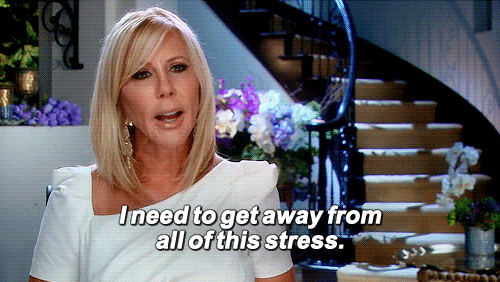Stress hormones and your sex life

This (not) just in: the world as we know it isn’t always the sexiest place to be. If it’s not work stress, money stress, family stress, or relationship stress, it’s climate change, genocide, or the threat of nuclear war. Ya heard it here first. Even on the best of days, it can be damn hard to conjure enough relaxed transcendence to wanna strip down and board that train to funky town, nam sayin’?
The reality is, more than half of women—and lots of men too—live with chronic stress. Not hawt but true: stress and a healthy sex drive aren’t friends, and funky town ain’t quite big enough for the two of ‘em. Even if you don’t feel majorly stressed about anything specific, “low-level,” below-the-radar stress can be chronic too, and it has a very real impact (read: it can absolutely affect your sex drive). And in turn, a diminished sex drive can worsen stress by triggering relationship problems or compromising overall joie de vivre. It's a ruthless cycle.

All this to say that strengthening your approach to stress management really is everything: in addition to enhancing your physical, emotional, and hell, even spiritual health, it’s sure to improve your sex life too. This is important, because having sex is key to your health ‘n happiness. Even better, having sex leads to wanting more sex. It’s a vivifying cycle.
How stress gets down ’n dirty with your sex life
Under normal, non-stressy conditions, your sex life is driven by your sex hormones: estrogen, progesterone, and testosterone work together to make it happen, rising and falling at particular points in your monthly cycle. But under heavy stress and duress, your infamous fight-or-flight mechanism kicks in, and your adrenal glands release the stress hormone cortisol, which suppresses your sex hormones so your system can go into survival mode. This means that life-or-death functions like keeping that heart beating take precedence over so-called secondary functions like sex and other pleasures. To this end, your adrenals also release the hormone epinephrine (AKA adrenaline) into your bloodstream causing your heart to beat faster and pushing blood to the muscles, heart, and other vital organs.
Too much cortisol can “cock-block” you in the following ways:
- It lowers testosterone, AKA the hormone that makes you feel desire and arousal.
- It lowers DHEA (dehydroepiandrosterone), the steroidal hormone that metabolizes into estrogen and testosterone.
- It leads to other symptoms that get in the way of a happy sex drive, like weight gain, intense cravings, extreme fatigue, and insomnia.

When stress is short-lived, your body gets over it and your desire reemerges after a while, unscathed. But if the stress never really goes away (it happens!), all things sex, pleasure, and joy-related get put on perpetual delay. Our bodies, as it turns out, don't differentiate between emotional and physical stress, so “lock-down,” if you will, happens across the board, in body and mind alike.
Stress can induce the following mind-based or psychological barriers to sex:
- An overwhelmed, hectic mind ultimately distracts you from wanting sex (no matter how much you want to want it), or from being present while having sex.
- Regular stress can lead to anxiety and depression, both of which—big surprise—can kick your libido while it's down.
- Uncontrolled stress can lead to bad habits like smoking, drinking, overeating, and ignoring self-care—which, in turn, impacts self-confidence and interferes with a healthy sex life.
Ways to transcend stress and reclaim sex
Even if your stress is unrelenting, there are ways to cope and reclaim the soft, hot caress of desire. With a little time, effort, and some deep breathing, all is possible.
Here are a few strategies to consider:
Manage your stress.
If you can’t immediately remove the source of your stress altogether (i.e, get out of a bad relationship, quit a shitty job, end a toxic friendship, etc.), lay the groundwork for doing so asap. In the meantime, solid management tactics are everything. If your stress response is tempered with effective relaxation techniques, you won’t experience as many hormonal issues, and your sex life won’t be as affected. A few techniques to consider include: breathing exercises, yoga, meditation, journaling, and exercise. And hey, sometimes, exercise leads to sexercise!

Eat right.
In case you haven’t heard, the way you eat can both reduce stress and stoke your lust. That’s right. You might try increasing your intake of hormone-happy foods like avocado, which helps to increase your production of estrogen, progesterone, and testosterone alike. Cruciferous veggies are everything to hormone detox and balance. And going organic can save your system from a host of damaging pesticides that can have a negative impact on your sexual health. Never underestimate the power of food.
Take a supportive supplement.
If your stress is always high, your cortisol production can easily get out of control. Plant chemicals like l-theanine and phosphatidylserine can calm the adrenals and shift your body away from heavy cortisol production, instead veering you in the direction of higher DHEA, to support a natural and harmonious sex hormone balance. You know, so your body can relax. Do your research so you can find a supplement that works for your specific needs.
Add a sex toy to the mix.
If at least some of your stress is coming from less-than-stellar sex (!), you might consider introducing a sex toy to your sexual repertoire. Toys are a great idea, with or without a partner—you heard it here first. And so is masturbation. Whatever you’re up to, consider embracing some good vibes to enhance your experience and release some of that pent up stress and tension.
Just go to sleep.
Sometimes the best way you can care for yourself is by taking care of your most basic needs. Sleep is one such need, and most people don’t get nearly enough. Plus, the sleep we do get is often compromised, disrupted, interrupted. Research shows that sleeping for longer periods helps balance your body and mind, and is therefore linked to higher sexual desire and arousal.

Consider therapy.
There are about as many types of therapy out there these days as there are moods. From somatic therapy, to talk therapy, sex therapy, couples therapy, the list is long. Not to mention, online and in-person sessions are readily available. If you’re at a point where you feel like some external guidance could be the missing ingredient in your stress recovery (and sex-life recovery) efforts, do not hesitate to shop around and find a therapist that works for you and your needs!
Yes, life is stressful, and the world can be a hostile, demanding place. But sometimes the most productive thing you can do is take your next breath. You got this.